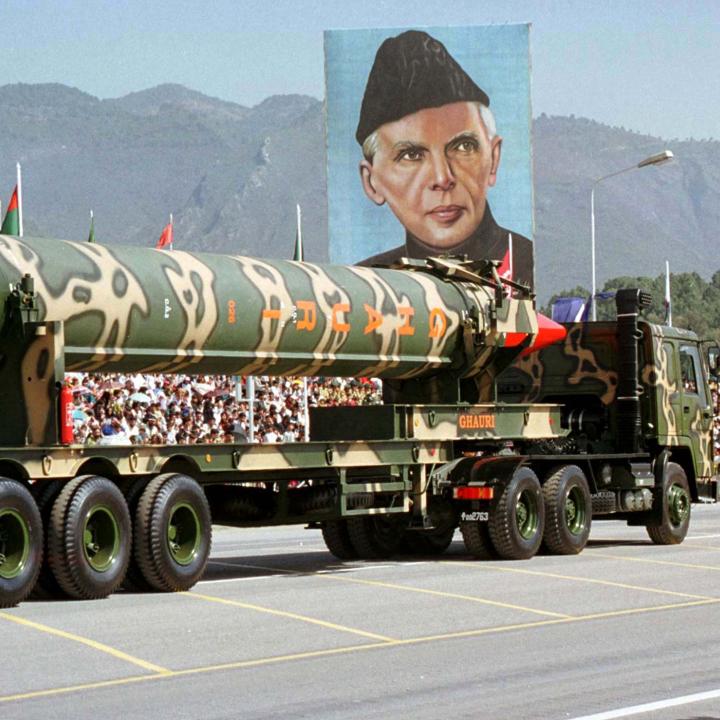

Deadlock in the Iran nuclear talks may prompt action by Riyadh, with Pakistani support.
On April 28, Pakistan’s new prime minister, Shehbaz Sharif, will start a three-day visit to Saudi Arabia, his first foreign trip since taking over from Imran Khan, who was voted out of office earlier this month. The visit is, in part, meant as a pilgrimage, but it will also include high-level meetings, with one expected to be held with the kingdom’s de facto leader, Crown Prince Muhammad bin Salman.
The meetings will be an opportunity to repair Saudi-Pakistan relations, which were strained during the mercurial leadership of Imran Khan, whose term began in 2018. In part, this was a consequence of Khan’s outreach to states like Malaysia, Iran, and Turkey, efforts that stopped when Riyadh made clear that they jeopardized Saudi financial support. But it also reflected Riyadh’s growing commercial and diplomatic links with India, Pakistan’s historical adversary and nuclear rival.
The Saudi-Pakistan nuclear nexus goes back decades. An April 26 op-ed in the Saudi English-language Arab News by a former Saudi ambassador in Islamabad notes that in the 1970s “Saudi Arabia...provided financial aid to the Bhutto regime in order to thwart India’s nuclear ambitions,” after New Delhi had conducted a test in 1974.
Perhaps even more pertinently, Shehbaz Sharif’s brother and then prime minister Nawaz Sharif had welcomed Saudi defense minister Prince Sultan to the enrichment plant at Kahuta outside Islamabad in June 1999, a year after Pakistan had conducted two nuclear tests (see picture below). Apart from touring the centrifuge enrichment plant, the Saudi delegation was shown the Ghauri missile, Pakistan’s version of a nuclear-capable North Korean type, and real-size models of nuclear weapons. (The visit prompted an official U.S. diplomatic protest.) Subsequently, a Saudi prince watched a test-firing of the Ghauri missile. In the desert south of Riyadh, a Saudi missile factory seems to be an exact copy of a Pakistani plant that assembled the Chinese M-11, another nuclear-capable weapon.
A reason for particular attention this week is Muhammad bin Salman’s 2018 comment on U.S. television: “If Iran developed a nuclear bomb, we will follow suit as soon as possible.” In 2020, the Wall Street Journal reported that China had helped the kingdom build a plant to process uranium ore, and the New York Times pinpointed a mystery facility thought to be nuclear related. With negotiations seemingly stalled to return to the Joint Comprehensive Plan of Action, as the Iran nuclear accord is known, and speculation that Iran is within two weeks of having a so-called breakout capability, it would be surprising if possible new nuclear cooperation did not come up in bilateral talks.
In the past, discussion of Pakistani nuclear aid to Saudi Arabia has concentrated on possible deployment of Pakistani nuclear-tipped missiles to the kingdom. But current thinking holds that Pakistan may have supplied enrichment technology using the network of the late Dr. A. Q. Khan, who was placed under house arrest in 2004. The degree to which Khan was a rogue agent, operating independently of the powerful Pakistani military, has always been debatable, and Saudi Arabia may have been the mystery “fourth customer” thought to have existed, in addition to Iran, Libya, and North Korea.
Access to civilian nuclear technology is already one of Riyadh’s “asks” from the Biden administration. Given the reported leadership tension between Saudi Arabia and the United States, any future Saudi-Pakistan military nuclear cooperation will likely prompt a new crisis.
Simon Henderson is the Baker Fellow and director of the Bernstein Program on Gulf and Energy Policy at The Washington Institute.




